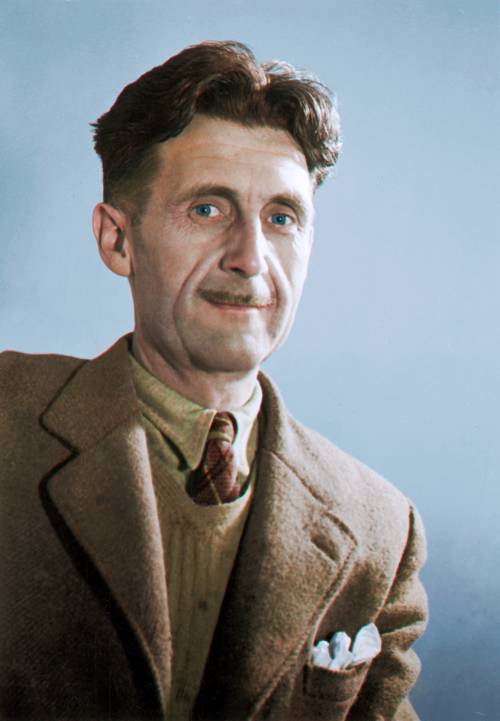
FAQ About George Orwell

Who was George Orwell?
George Orwell was a British writer and journalist born on June 25, 1903, in Motihari, India. His real name was Eric Arthur Blair. He is best known for his novels "1984" and "Animal Farm," which explore themes of totalitarianism, social injustice, and the human condition. Orwell's work is celebrated for its lucidity, awareness of social injustice, and opposition to totalitarianism.

What is George Orwell's most famous book?
George Orwell's most famous books are "1984" and "Animal Farm." "1984," published in 1949, is a dystopian novel set in a totalitarian society, while "Animal Farm," released in 1945, is an allegorical novella about a group of farm animals who overthrow their human owner, only to be subjected to a tyrannical regime of their own. Both books have had a profound impact on culture and politics and are widely studied in schools and universities around the world.

What themes are commonly explored in George Orwell's works?
George Orwell's works often explore themes of totalitarianism, social injustice, censorship, and the abuse of power. His writings frequently critique oppressive government regimes and emphasize the importance of freedom and individuality. Orwell also delved into the destructive effects of political ideology and propaganda, using sharp prose and poignant storytelling to deliver his messages.

What inspired George Orwell to write '1984'?
George Orwell was inspired to write "1984" by the rise of totalitarian regimes in the 20th century, particularly those of Nazi Germany and the Soviet Union. His experiences during the Spanish Civil War, where he witnessed the manipulation of truth and the suppression of individual freedoms by political entities, also heavily influenced his outlook and writing. Orwell sought to highlight the dangers of giving unchecked power to governments and the resulting societal harm.

What is 'Animal Farm' about?
"Animal Farm" is an allegorical novella by George Orwell that tells the story of a group of farm animals who rebel against their human farmer, hoping to establish a society based on equality and freedom. However, the pigs, who lead the revolution, gradually become as oppressive as the humans they overthrew. The novella serves as a critique of the corruption of revolutionary ideals and the dangers of totalitarianism, symbolizing the events leading up to the Russian Revolution of 1917 and the Stalinist era of the Soviet Union.

Why did George Orwell use a pen name?
George Orwell adopted his pen name for several reasons. His birth name, Eric Arthur Blair, did not sound distinct or memorable, and he wished to separate his personal life from his writing career. Additionally, as he was publishing his first book "Down and Out in Paris and London," a semi-autobiographical account of his experiences with poverty, he was concerned about the potential embarrassment it might cause to his family. The name 'George Orwell' was chosen as it was a traditional English name, and 'Orwell' is also the name of a river in Suffolk, England, which held sentimental value to him.

When did George Orwell write '1984'?
George Orwell wrote "1984" between 1947 and 1948. The novel was completed during a period of ill health while Orwell was living on the Scottish island of Jura. It was first published on June 8, 1949, offering a stark warning about the perils of unchecked political power and the havoc it can wreak on individual freedom and truth.

Where was George Orwell born?
George Orwell was born in Motihari, Bihar, in British India on June 25, 1903. At the time of his birth, his father was working for the British Civil Service in India. Orwell moved to England with his mother and sisters in 1904.

How did George Orwell's experience in the Spanish Civil War influence his writing?
George Orwell's experiences in the Spanish Civil War had a profound impact on his outlook and writing. As a combatant fighting against the fascist forces, Orwell witnessed firsthand the brutality and propaganda used by totalitarian regimes. His disillusionment with the factionalism and betrayal among the anti-fascist forces deeply affected him. These experiences informed his skepticism of propaganda, his passion for truth, and were seminal in shaping his anti-totalitarian view, themes that became central to his later works like "1984" and "Animal Farm."

What is the significance of 'Newspeak' in '1984'?
'Newspeak' is a fictional language in George Orwell's "1984." It is a tool of the oppressive regime known as the Party, designed to limit freedom of thought and concepts that pose a threat to the Party's power, such as freedom, self-expression, and individuality. By systematically reducing the language, critical thinking and rebellion are stifled, illustrating Orwell's concerns about how language can be used as a tool for oppressive control in any totalitarian regime.

How is totalitarianism depicted in George Orwell's '1984'?
In "1984," totalitarianism is depicted as an all-encompassing system of government that exercises absolute control over every aspect of individual life. This is achieved through constant surveillance, stringent control of information and history, and the use of language as a tool for oppression (through 'Newspeak'). The regime, personified by the Party and its leader, Big Brother, fosters fear, brainwashing, and unwavering loyalty, illustrating Orwell's warning about the potential dangers of unchecked state power and the erasure of personal freedom.

What are some lesser-known works by George Orwell?
In addition to "1984" and "Animal Farm," George Orwell wrote several other significant works. "Homage to Catalonia" is an account of his experiences in the Spanish Civil War. "Down and Out in Paris and London" is a memoir describing his experiences of poverty in both cities. "The Road to Wigan Pier" explores the life of the working class in northern England, and "Burmese Days" is a novel reflecting on his time as a police officer in colonial Burma. These works further showcase Orwell's political views and literary talents.

How did George Orwell die?
George Orwell died on January 21, 1950, in London, England. His death was due to complications arising from tuberculosis, which he had been suffering from for several years. Despite ongoing health issues, Orwell continued to write up until his death, leaving behind a legacy of influential political writing and critique.

How does 'Animal Farm' explore the theme of power and corruption?
In "Animal Farm," George Orwell explores the theme of power and corruption through the gradual transformation of the farm's government. Initially, the farm animals unite under the false promise of equality but, as the pigs gain control, they become increasingly indistinguishable from the oppressive humans. The farm's descent into tyranny highlights Orwell's critique of how revolutions may result in the replacement of one form of totalitarianism with another, illustrating the potential for power to corrupt and betray revolutionary ideals.

What was George Orwell's real name?
George Orwell's real name was Eric Arthur Blair. He chose the pen name 'George Orwell' when publishing his first book, "Down and Out in Paris and London," both to differentiate his literary work from his personal life and because he wanted a name that better reflected English heritage. 'Orwell' comes from a river in Suffolk, England.

Why is George Orwell's '1984' considered a classic?
George Orwell's "1984" is considered a classic because of its profound exploration of themes like totalitarianism, censorship, and surveillance. Its portrayal of a dystopian future controlled by an oppressive regime continues to resonate with readers because of its powerful insights into the dangers of unchecked government power. The novel's complex characters, evocative storyline, and the introduction of concepts like 'Big Brother' and 'Newspeak' have left a lasting impact on literature and political thought, keeping it relevant more than seven decades since its publication.

What was the impact of 'Animal Farm' when it was published?
Upon its publication in 1945, "Animal Farm" was met with both critical acclaim and controversy. As an allegory of the Russian Revolution and the rise of Stalinism, it offered a poignant critique of the Soviet regime. While celebrated for its clever storytelling and political insight, the book was also criticized and censored by some who viewed its content as a challenge to Soviet ideology. The clear allegorical nature helped solidify Orwell's reputation as a commentator on political matters and expanded his influence beyond literature.

Did George Orwell win any awards for his literature?
Despite his significant contributions to literature and journalism, George Orwell did not receive major literary awards during his lifetime. His works, however, have gained critical acclaim and significant influence posthumously, with "1984" and "Animal Farm" being particularly heralded as classics within both the dystopian and political fiction genres.

What is the significance of the character Big Brother in '1984'?
The character Big Brother in George Orwell's "1984" symbolizes the oppressive control of the totalitarian state. Though never seen in person, Big Brother represents the Party's power and surveillance infrastructure, constantly monitoring the citizens to maintain an unchallengeable regime. The phrase "Big Brother is watching you" epitomizes the psychological manipulation and oppressive surveillance tactics that the novel warns against, serving as a metaphor for dehumanizing government overreach and control.

What were George Orwell's views on socialism and capitalism?
George Orwell was a critic of both unfettered capitalism and oppressive socialist states. He identified himself as a democratic socialist, advocating for equitable distribution of resources and power. Orwell opposed the concentration of power in the hands of a few and critiqued both capitalism's increase of inequality and the tyrannical tendencies of totalitarian socialism. His experiences, particularly in the Spanish Civil War, shaped his belief in democratic socialism while maintaining skepticism towards any form of ideology that could suppress individual freedoms.
